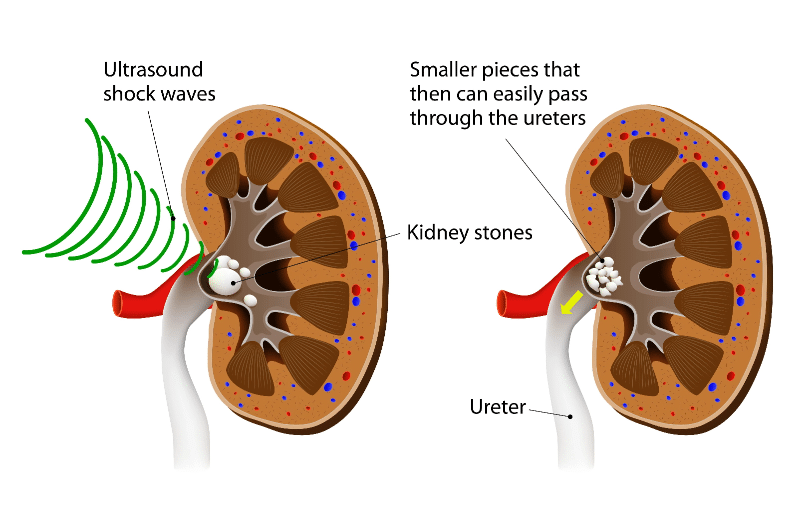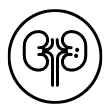Kidney Stones
Symptoms & Causes
Treatments & Procedures
Overview
Kidney stones are small, hard deposits consisting of mineral and acid salts that crystallize when urine becomes concentrated. Although kidney stones originate in the kidneys, they can affect any part of the urinary tract. Millions of people are diagnosed with urolithiasis, or kidney stone disease, each year. It is one of the most painful conditions treated in the field of urology, and every kidney stone patient shares the same goal of prompt, safe relief.
Symptoms
Kidney stones are rarely life threatening; however, they can be extremely painful, they frequently move through the urinary tract and can cause irritation and blockages. Symptoms including pain, fever, nausea, and blood in the urine may occur as a result. Depending on the location, composition, and size of the stones, they can even cause serious damage to the kidneys.
There are many symptoms to alert you that you may have or are passing a kidney stone. These include:
• Severe pain in the side of the torso and back, or below the rib cage
• Pain in the lower abdomen and groin area • Pain that comes in waves, while varying in intensity • Pain while urinating • Discolored urine • Unusually cloudy or unusual smelling urine • Feeling the need to vomit (or vomiting) • Feeling the urgent need to empty the bladder • Visiting the restroom more often than normal • High temperatures and chills, if an infection is present • Urinating in small quantities
Causes
Kidney stones occur when substances that are normally dissolved in the urine begin to crystallize inside the body. Once stones have begun to form, they become larger as new crystalline deposits form around the original kidney stone.
Biology
Kidney stones are more common in men than women.
Diet
You may also have other issues with your diet or metabolism that need to be addressed.
Water
Kidney stones are often caused by not drinking enough water.
Age
Prevalence increases when a person reaches his or her 40s. For women, kidney stones reach peak prevalence at age 50.
Family
Kidney stones run in families and can come back over and over, so it is important to try to prevent them from forming before you have pain or need surgery.
Summer is Kidney Stone Season!
Kidney Stone Care at Integrative Urology
Advanced Treatment Methods for Kidney Stones
During a thorough evaluation, we will discuss your symptoms with you and work quickly to diagnose the cause of your pain and discomfort. Blood work, comprehensive urine tests, X-rays, and computed tomography (CT) scans may be used to confirm your diagnosis.
To address kidney stones, Integrative Urology offers advanced treatment options such as:
Extracorporeal Shockwave Lithotripsy (ESWL)
A minimally invasive technology that breaks up kidney stones by using focused ultrasound waves. Waves are introduced to the body externally, so no incision or endoscopy is required for ESWL. The shock waves break large kidney stones into smaller pieces, which will allow for easier passage. The process takes about an hour to complete, in most cases. For a few days after treatment, patients can expect mild pain while urinating.
Benefits:
Incision Free
Quick Procedure 1 hour
Minimally Invasive

Laser Lithotripsy
A minimally invasive, incision-less surgery that allows visualization and removal of stones directly from the kidney endoscopically, or with the use of a small camera. Good for small to moderate kidney stones, especially for hard to reach stones in the bottom of the kidney
Benefits:
Incision Free

High Success Rate
Minimally Invasive
Percutaneous Nephrolithotomy (PCNL)
A complex surgery that allows removal of stones directly from the kidney through a small incision in the back. Good for large stones located in the kidneys that may otherwise require multiple less invasive surgeries.
Benefits:

Good for Large Stones
Robotic Surgery
Involves using laparoscopic, robotic micro-tools that make tiny incisions and remove very large kidney stones. The procedure is minimally invasive and greatly reduces scarring and healing time, when compared to traditional open surgery.
Benefits:

Good for Large Stones

High Success Rate
Stone Prevention Profile
Integrative Urology can offer medications and recommend dietary changes that will help prevent kidney stones from recurring. Even after kidney stones have been successfully treated, patients who have had them are greater than 50% more likely to experience them again than someone who has never had kidney stones.
Dr. Mark Hong Explains Urolift, with Patient Experience
At Integrative Urology we understand the pain and complications the condition can cause. Our state-of-the-art techniques and modern facility can help you find relief in the quickest, safest way possible.
